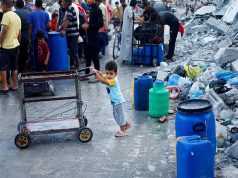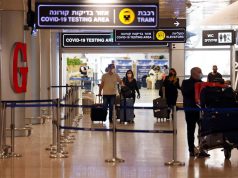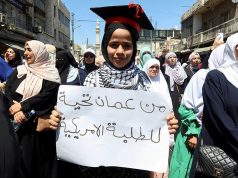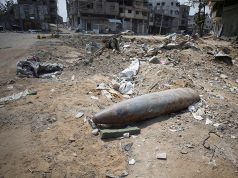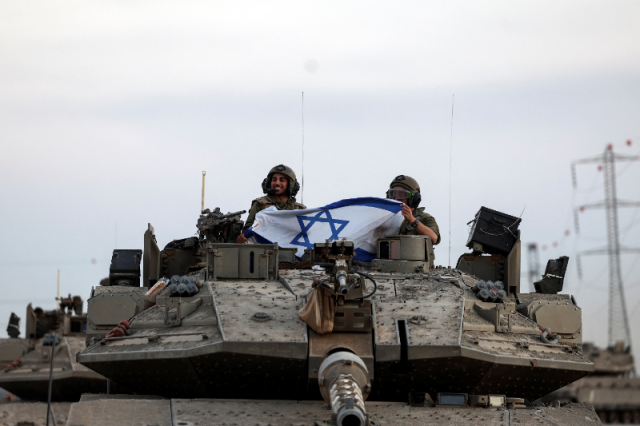
- Blinken tells Israel U.S. will ‘always be there’
- U.S. vows Iran will not access $6 billion in funds any time soon
- Hamas calls for Friday protests in East Jerusalem, West Bank
- Security concerns in U.S., Europe
JERUSALEM/GAZA/TEL AVIV — Israel’s military chief said, “Now is the time for war,” as his country amassed tanks near the Gaza Strip ahead of a planned ground invasion to annihilate the Palestinian militant Hamas group that rules the enclave.
Seeking to build support for its response, Israel’s government showed U.S. Secretary of State Antony Blinken and NATO defense ministers graphic images of children and civilians they said Hamas had killed in a weekend rampage in Israel.
Blinken said they showed a baby “riddled with bullets,” soldiers beheaded and young people burned in their cars. “It’s simply depravity in the worst imaginable way,” he said. “It’s really beyond anything that we can comprehend.”
Israel has vowed to retaliate for the attack, the deadliest by Palestinian militants in Israeli history.
Like others across the globe, Blinken urged Israel to show restraint, but he also reiterated America’s support, saying: “We will always be there by your side.”
On Friday he was due to meet King Abdullah and Mahmoud Abbas, head of the Palestinian Authority in the Israeli-occupied West Bank, in Jordan as part of a Middle East tour aimed at stopping spillover from the war.
America’s top diplomat, Blinken planned to visit key U.S. allies Qatar, Saudi Arabia, Egypt and the United Arab Emirates – some with influence on Hamas, an Islamist group backed by Iran.
Israel’s military chief, Lieutenant General Herzi Halevi, said lessons would be drawn from the security failures around Gaza that enabled the attack. “We will learn, investigate, but now is the time for war,” he said.
The U.S. military is placing no conditions on its security assistance to Israel, U.S. Defense Secretary Lloyd Austin said, adding Washington expected Israel’s military to “do the right things” in prosecuting its war against Hamas.
Austin was due in Israel on Friday and planned to meet Israeli Prime Minister Benjamin Netanyahu.
Hamas called on Palestinians to rise up on Friday in protest at Israel’s bombardment of the enclave, urging Palestinians to march to East Jerusalem’s Al-Aqsa Mosque and clash with Israeli troops in the occupied West Bank.
Unity government calls Israeli parliament
Israel’s parliament approved Netanyahu’s emergency unity government late on Thursday, including a number of centrist opposition lawmakers, to display the country’s united determination to fight Hamas.
Public broadcaster Kan said the Israeli death toll had risen to more than 1,300. Scores of Israeli and foreign hostages were taken back to Gaza; Israel said it had identified 97 of them.
Israel has responded so far by putting Gaza, home to 2.3 million people, under siege and launching a bombing campaign that destroyed whole neighbourhoods. Gaza authorities said more than 1,500 Palestinians had been killed.
The International Committee of the Red Cross (ICRC) said fuel powering emergency generators at hospitals in Gaza could run out within hours and the United Nations World Food Programme (WFP) warned food and fresh water were running dangerously low.
“The human misery caused by this escalation is abhorrent, and I implore the sides to reduce the suffering of civilians,” ICRC regional director Fabrizio Carboni said.
The International Criminal Court said it has jurisdiction over potential war crimes carried out by Hamas and by Israelis in the Gaza Strip.
Washington said Iran would not gain access any time soon to $6 billion in Iranian funds parked in a Qatar bank last month as part of a prisoner exchange. Iran has celebrated the attacks while denying a direct role.
Safety concerns prompt security measures
The conflict spurred some civil unrest in Europe, with police in Paris using tear gas and water cannon to break up a banned rally in support of the Palestinian people. Some Jewish schools in Amsterdam and London were set to close temporarily due to safety concerns.
U.S. law enforcement officials in New York and Los Angeles said they had a stepped up police presence for Friday, especially around synagogues and Jewish community centers, but some officials sought to play down the threat.
New York Governor Kathy Hochul said parents should make a “personal choice” whether to pull children from religious schools or to skip synagogue on Friday night in response to the call of pro-Palestinian protests.
The Arab American Anti-Discrimination Committee, an Arab advocacy group, said on Thursday that FBI agents had visited mosques in different states and individual U.S. residents with Palestinian roots, calling it a “troubling trend.”In Jerusalem, scores of Israelis gathered at the Mount Herzl military cemetery on Thursday to bury their dead.
“When you didn’t take my call, I knew you were fighting with all your power. When I realised you were missing, I could not imagine this is how it would end,” one mourner said.
In Gaza’s main southern city Khan Younis, where cemeteries were already full, dead were being buried in empty lots, like the Samour family, killed on Wednesday night in a strike that hit their house.
Palestinian rescue worker Ibrahim Hamdan drove from one bomb site to another as his team tried to pull survivors from houses destroyed by the Israeli air strikes.
“This war is harsh beyond imagining. They are collapsing people’s buildings without warning. They knock down high-rise buildings on top of their residents,” said Hamdan, who has worked through repeated wars since becoming a rescuer in 2007.
Gazans, mainly descendants of refugees who fled or were expelled from homes in Israel at its founding in 1948, have suffered economic collapse and repeated Israeli bombardment under a blockade since Hamas seized power there 16 years ago.
Palestinian anger has mounted in recent months, with Israel carrying out the deadliest crackdown for years in the West Bank and its right-wing government talking of seizing more land. A peace process meant to create a Palestinian state collapsed a decade ago, which Palestinian leaders say left the population with no hope, strengthening extremists.
– Reporting by Henriette Chacar, Dedi Hayun, Maayan Lubell and Emily Rose in Jerusalem and Nidal al-Mughrabi in Gaza, Emma Farge in Geneva, Jeff Mason in Washington, Humeyra Pamuk in Tel Aviv, Steve Gorman and Dan Whitcomb in Los Angeles; Writing by Michael Martina; Editing by Howard Goller




